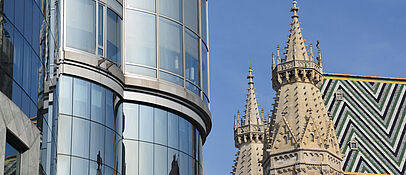Foundation
The Faculty of Catholic Theology was founded by Duke Albrecht III. and Pope Urban VI. gave the clerical approval on 21st February 1384. Therefore, it is the oldest faculty of theology in the German-speaking world.
Middle Ages
The importance of the faculty in the Middle Ages was documented by the founder Professors Heinrich von Langenstein and Heinrich Totting von Oyta. In addition, Theologians from Vienna played a significant role at the Councils of Constance and Basel. Furthermore, a large number of students at the faculty helped the faculty attain distinction.
Modern times
After a stagnation period during Reformation, the faculty regained importance through Petrus Canisius, who was the first German member of the Society of Jesus. He worked as a professor and dean of the faculty and advocated a reform of the studies under the government of Ferdinand I. From 1551 until its dissolution in 1773, mainly members of the Society of Jesus were working as professors of theology. Again, the numbers of students increased significantly. In 1774, Franz Stephan Rautenstrauch reformed the academic studies, and for the first time the subjects "Historical Theology" and "Pastoral Theology" were included in the curriculum.
19th to 20th century
From the mid-19th century onwards, there was a period of stagnation of theological research, because theology as an area of science was put into question. Nevertheless Anton Günther, one of the most influential theologians of the 19th century, worked in Vienna. Dealing with German idealism, he sought a new philosophical foundation of Catholic Theology. In the era of National Socialism, the faculty was the only Faculty of Catholic Theology in Austria, which, though limited, could carry on their operation. After 1945 the Faculty of Catholic Theology became a center of theological-scientific research again, differentiating its teaching and increasing its study programmes.
Present
Today, the Faculty of Catholic Theology is one of 15 faculties and 5 centres at the University of Vienna and one of the largest in the German-speaking world. It sees itself as a place of academic research and study in dialogue with other sciences, with members of the public society and the Church. Currently there are about 1.000 students from 36 different countries, of which around 46% are women, studying at the Faculty of Catholic Theology. Students can choose between 12 different degree programmes (Bachelor-, Master-, Diploma-, Doctoral- and PhD-programmes). About 70 scientists currently work at the Faculty. The Faculty is structured in seven departments, 15 subject areas and two main foci of research. The Faculty of Catholic Theology is a member of two research platforms of the University of Vienna. The Library of the Faculty of Catholic and Protestant Theology holds 350.000 volumes and is therefore one of the largest theological libraries in Central Europe.
Further Literature:
Johann Reikerstorfer/Martin Jäggle (Hg.): Vorwärtserinnerungen. 625 Jahre Katholisch-Theologische Fakultät der Universität Wien, Göttingen 2009
Ernst Chr. Suttner (Hg.): Die Kath.-Theologische Fakultät der Universität Wien 1884-1984. Festschrift zum 600-Jahr-Jubiläum. Berlin: Duncker & Humblot 1984
Anton Wappler: Geschichte der theologischen Facultät der K.K. Universität zu Wien. Festschrift zur Jubelfeier ihres fünfhundertjährigen Bestehens. Wien: Wilhelm Braumüller 1884

